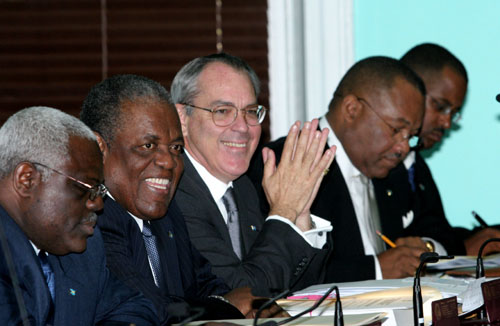Members of the front bench in the Free National Movement Government. (file photo)
Nassau, The Bahamas – In a thorough, comprehensive contribution to debate on an Opposition-led resolution to appoint a House Select Committee on Crime, Prime Minister Hubert Ingraham pledged the government’s full support to the Committee, pointing to the importance of bi-partisan unity in the fight against criminals in The Bahamas.
LISTEN NOW – Prime Minister Ingraham’s Contribution
THE FULL TEXT Of PRIME MINISTER:
I wish to express my support and that of my Government for the proposal by the honourable member for Bain and Grants Town, for the appointment of a Parliamentary Committee to investigate which social conditions have impacted the levels of crime, to review the extent to which public institutions have added to the problem, to evaluate the impact, if any, that conclusions and recommendations of Committees and Commissions appointed by Governments to study the Problem may have had.
No one has been able to come up with an acceptable and definitive reason for crime. We have all sorts of bits and pieces; unemployment, poverty, environment, neighbourhoods and a whole host of things.
It is important, I believe, as we debate all matters related to crime and criminality, a problem which I myself have previously identified as the single most serious threat to our community, that we do not contribute to an increase in the level of fear in our society; and that always we are mindful of the facts and separate them from commentary and wild speculation.
That said, I, as all of us in this place and in our country, am increasingly concerned with the level of violent crime.
We are especially concerned that the perpetrators of crime include frightfully young persons.
The member for Farm Road and Centreville mentioned police in schools. The fact is, when young Rico Farrington was killed at CC Sweeting Senior High School, two policemen were on the campus at the same time in uniform. They were there for other purposes.
Also this week in Freeport another student was assaulted also on the school campus.
It’s not that crime suddenly increased last year.
The level of criminality in our society has been on a constant rise since the 1980’s interrupted only occasionally by small dips in the number of crimes reported annually.
It is also true I believe, that the responses to rising crime by Governments over the years have been holistic – resulting in new and amended legislation in response to criminal activity; improving resources and training available to the police; increasing and expanding resources – financial and human and other wise to enhance the legal and judicial systems; implementing mentoring programmes through the government operated education system, support for social services outreach; marginally improving the penal system and expanding rehabilitative programmes.
Clearly, our efforts have not had the desired results, for notwithstanding, crime has continued to increase. Efforts to date to address the most glaring deficiencies in our systems and processes must be redoubled. Our efforts, most particularly so in our legal, judicial and penal systems must be redoubled.
Recently, in the debate in this place on the amendment to the Juries Act I commented that Bahamians everywhere, but especially in New Providence Island, have long complained that crime in our country is unacceptable high.
And, I also recall our long time complaint that the judicial system is too slow; that it continues to lumber under antiquated laws, processes and procedures that contribute to delays.
Last September, the Minister Responsible for National Security convened a National Assembly on Crime, to discuss with all the stakeholders in our society the development of a national approach to fighting crime.
Thereafter, a National Crime Council was named to continue to review conditions in our communities and to make recommendations for appropriate interventions by both public and private sector organizations and agencies. That work continues today.
But such work and such initiatives are not new in The Bahamas.
The Honourable Member for Grants and Bain Town has commented on a number of initiatives by governments over the year that have involved Committees studying and Reporting on the condition and status of Youth, Education, the Family, the restructuring of the Police Force and of the Penal System, the issue of domestic violence and the general causes of Crime in the community – all in efforts to address problems confronting our people in society. I do not disagree with much of what he has said.
I would wish to note that the response to crime in our society cannot be fully or properly addressed only by us in this parliament.
In that vein, it is appropriate for me to acknowledge that among a number of very helpful initiatives from other sectors of our community is the admirable initiative by the Roman Catholic Church to respond to youth “at risk” through the development of the YEAST Programme.
When we were last in Government, much as the Government traditionally has lent assistance to youth programmes in the community; we lent both financial and other support to the YEAST Programme.
Members Opposite also when in Government, lent support to the programme. It was unfortunate in my view, , that Government support eventually resulted in the programme being moved to Andros where 65 young boys are enrolled in the programme now.
Government’s financial support of the programme has grown to some $871,000 annually, more than $13,000 a year per boy. I am forced to question whether that $871,000 might not have assisted a greater number of young boys if instead of bringing YEAST into the Government sector, the money had not simply been made available to the Catholic Church to continue and expand its programme.
This is a programme I hope the Committee, when granted, will review.
The objective of this programme is, as stated, first of all that the beneficiaries of the programme are supposed to be low income, low-skilled, unmotivated, at-risk adolescent males between the ages of 12 and 19 who have abandoned or been abandoned by formal education, and who have adopted or are in danger of adopting a life of crime.
And the objectives of the programme are supposed to be to interrupt the continuing cycle of incompetence, violence, aimlessness, deficiency and despair among adolescent males ages 12 to 19…to restore their dignity and value by teaching them marketable skills, improving their self esteem and self image…and to help them develop positive attitudes so that they would become self-reliant, productive and useful citizens in their community.
The truth of the matter, no matter how desirable it is, is that The Bahamas is unable to afford to pay $13,000 per boy between the ages of 12 and 19. There has to be other means by which we can do this.
In this same vein, I wish to comment on an innovative work placement scheme for academic under-achievers instituted at C.C Sweeting High School which places students in the work place – in hotels or other enterprises where they might acquire life skills in the hospitality sector or in the automotive or welding business – three days a week. These students get a jump-start on employment useful once they have completed their studies. It has proven a very useful tool at keeping young boys who may otherwise have dropped out of school, continue in school and learning.
I am told that other schools have similar programmes.
It seems to me that several hundred thousand dollars dedicated to senior high schools can go a long way in helping young boys.
One of the most thorough studies of crime in our community was indeed conducted by the Blue Ribbon Commission appointed by me on 28th May, 1998 to “identify the main causes of crime in The Bahamas and to make recommendations for the remediation of the same…”
The Commission, Chaired by Chief Justice Sir Burton Hall, reported in 30th November, 1998. Others serving on that Commission included noted psychiatrist Dr. David Allen; Criminologist and present Superintendent of the Prison, Dr. Elliston Rahming, Sociologist, Ms. Jessica Minnis of the College of The Bahamas, Ms. Sharon Poitier, and church leaders including Pastors Keith Albury, Jonathan Carey, Bishops Cephas Ferguson, Simeon Hall, Rev. Charles Sweeting and the late Archdeacon William Thompson, himself a victim of a terrible crime.
The Commission made far reaching recommendations some of which have been implemented in whole or in part and others which have not been advanced to the degree that we, (indeed all who sit in this place, I think) would have wished. In some instances, budgetary constraints have intervened.
But here again, these are matters we have the capacity to overcome.
In others, the shortage of adequate numbers of suitably qualified and available human resources have impacted the scale and duration of programmes introduced or expanded or otherwise improved in response to the report of the Commissioners.
I think one of the most telling aspect of the report was its commentary on Bahamian social norms and the ability of Bahamians to not only tolerate criminality but to excuse it for personal gain (greed) or even the potential for personal gain.
This might be explained colloquially “Man he sorry (or He didn’t mean anything by that), you need to give him another chance”. Or, “I will turn a blind eye when you ignore (or break) the law, if you agree to do the same for me”.
It would appear that such a casual attitude toward the law and indeed toward social norms that govern the relations between all of us is not unconnected to the escalation in crime – from petty crime to very serious and deadly crime.
And so, to the extent that we as a country have responded to and implemented the recommendations of the Crime Commission Report of 1998 is in many ways affected by a social mindset that is comfortable with moveable goal posts on socially acceptable behaviour.
I want very briefly to comment on a number of issues which repeatedly find themselves into the commentary and/or recommendations contained in Reports which seek to understand our social conditions and to address those social issues and conditions which may contribute to the break down of community and thereby to an increase in lawlessness and criminality.
- The importance of identity to an individual’s behaviour and demeanor in society. The high number of children in our society who continue to feel excluded and unimportant because of the failure of a parent (primarily fathers) to recognize them and to give them a name continues to grow. Children who do not feel or believe themselves to be valued members of society sometimes feel that they have little (or nothing) to lose by unsocial behaviour. We began to address this through legislation which determined that every child has a mother and a father. But we know all too well that legislation does not necessarily impact social behaviour.
- Children not recognized and accepted by two parents are typically those who live in the most dire economic conditions, feel unjustly deprived and sometimes respond with anger.
- The absence of positive spirituality in our community. Too few families attend church together; or some who do attend do not necessarily live what they preach.
- The same issue of hypocrisy among others in our community – political leaders, church leaders and business leaders – who call for standards of behaviour which they do not seek to achieve or follow in their own lives.
- The anti-social impact of foreign cultural influences invading us by every possible medium.
Mr. Speaker:
For the purposes of this debate I recall that among salient recommendations contained in the Crime Commissioners’ Report were the following:
- A call for increased foot patrols by uniformed officers, some of whom they recommended should be appropriately and conspicuously armed in business areas and areas of dense population. It was suggested that foot patrols be supported by vehicular patrols and plainclothes officers. Commissioners further suggest that in the City of Nassau and in all areas frequented by tourists there be maintained a conspicuous (unarmed) uniformed police presence supported by vehicular patrols and plainclothes officers. Such patrols to be a part of “community policing”.) This, I think, is being done and done fairly effectively.
- Improved enforcement of gaming laws.
[In] this society, you go to the gaming houses, and its like a bank on government payday. They are set up like a bank [with] hundreds and hundreds of persons.
Now, either we believe that it is illegal or we believe that it should be legal. I told the Commissioner of Police last week that it seems to me that we are unable to enforce that law and that I was going to give consideration to legalizing the number business.
He didn’t support me in that thinking, but the reality is that it is not an enforceable law and the society is doing it every day – there’s a webshop here and a webshop there all over the island – its nationwide.
And a national lottery will only get you so far because you will never be able to pay what Miami pays, or what Chicago or New York pays, so you will have the national lottery and that too, so you might as well legalise the whole thing since you can’t enforce it.
One of the things I would want the Committee to consider is what to do about the number business. Are we going to continue to have what is supposed to be an illegal activity openly flaunted in the society every day by thousands of Bahamians? We must either enforce the law or change it.
Secondly Mr. Speaker, when we were in office we amended the Shop License Act and we said the large food stores could only be open until 12:00pm. When our predecessors were in office, the Minister announced that they didn’t have to close at 12:00pm and they started opening until 3/4/5:00pm.
The reality is, either you change the law or you enforce it. I am not objecting to persons shopping on Sunday afternoon if they wish to do so, but it cannot be that we continue to allow the law to say 12:00pm and not do anything about it, the same as the number business.
Or [take], the Road Traffic Laws. It has been legal in The Bahamas since June 2002 to wear seat belts, no matter what anyone else tells you.
Somebody gets up and announces that it is suspended, well you cannot suspend the law by words. The law can only be suspended by an act of parliament. And so for the last five years-plus, we have not been enforcing the seatbelt law because some official edict came out saying it’s not going to be enforced.
The member for Farm Road and Centreville (Perry Christie) said today that in the Grants Town Urban Renewal programme, when they were demolishing houses they weren’t bothered by the Ministry of Works law about demolishing buildings. There is a law about how to demolish buildings.
The member for Farm Road and Centreville reportedly said on the radio that in terms of investments projects, sometimes you have to do it outside the law. You don’t have to. Just amend the law. That’s why people elect you – to be able to change laws and make laws.
- Road traffic laws, environmental regulations and laws restricting street vendors as the widespread non-enforcement of these laws contribute to a culture of disobedience of law. (Commissioners consider it to be a national scandal that these laws, while they remain, are so notoriously flouted. While not recommending the abolition of the proscription against gambling by residents of The Bahamas, Commissioners considered the early consideration of its amendment urgent.)
- Recommended improved treatment for drug abusers.
- Rejected calls for the establishment of a curfew for youth but recommended the establishment of some form of National Youth Service notwithstanding the reservations evident in the Youth Report. It would be wonderful if the Committee could come up with a recommendation that could get bi-partisan support for a national youth service.
- Recommended that the Ministries responsible for Social Services and Community Affairs identify officers from within their ranks who would co-ordinate volunteer educational and outreach programmes and, also, devise appropriate training programmes for those volunteers who would minister in those areas where suitable training is vital.
- Supported the creation of intervention teams trained to assist in all aspects of domestic and family crises, the sanction of the criminal law being the ultimate tool in the kit available to such a team.
The member for Sea Breeze (Carl Bethel) raised a very vital point. We have not thought about the laws in The Bahamas. We have not sought since we became independent to have really have true law reform in The Bahamas.
We still have too many Colonial laws on our books, and so we are going to seek to have real law reform in The Bahamas. And in doing so, we are not going to seek to have it on a political basis. We’d like the contribution and support of all in the society. We are amongst the most backward in the Caribbean when it comes to law reform.
- Recommended for consideration “victims’ rights”. They urged the Courts to become more “witness friendly”. The system of justice would only function effectively if people are confident that they will be treated in a professional and dignified manner by those who operate the system and included in this is the assurance that those who are adversely affected by crime are not further “victimised” by the system itself. It is unbelievable the level of intimidation of witnesses by criminals in this society and the impact this has on justice being served. You cannot have a democracy without a legal and judicial system that is effective.
It is good an important for us in this place to unite to fight against the criminals in this land.
We support the request to the Committee and will give it our full support look and forward to its Report.








